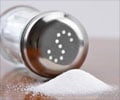Highlights
- The World Health Organization recommends a maximum of 5 grams of salt per day and the physiological need is 2 to 3 grams per day.
- A 12-year study in more than 4 000 //people assessed the relationship of salt intake and the development of heart failure.
- High salt intake, that is more than two teaspoons, can double the risk of heart failure.
Study Details
The 12-year study in more than 4 000 people assessed the relationship of salt intake and the development of heart failure. Using 24 hour sodium extraction, salt intake at the individual level was estimated.
This was a prospective follow-up study done in 4630 men and women aged 25 to 64 years. The subjects were randomly selected from the North Karelia Salt Study and the National FINRISK Study between 1979 and 2002 in Finland.
A self-administered questionnaire was used to collect details on health behavior. Weight, height and blood pressure, a venous blood sample for laboratory analysis, and collection of a 24 hour urine sample was done.At the study site, nurses measured urine volume and took a 100 ml sample for laboratory analysis. One gram of salt intake was calculated as equal to 17.1 mmol sodium excretion.
How Can Salt Intake Cause Heart Failure?
During the follow-up, 121 men and women developed new heart failure. In an age, sex, study year and area adjusted model, hazard ratios in the 2nd, 3rd, 4th and 5th salt intake quintiles, compared to the 1st one, were: 0.83, 1.40, 1.70 and 2.10. After further adjustment for systolic blood pressure, serum total cholesterol level and body mass index the hazard ratios were: 1.13, 1.45, 1.56 and 1.75, respectively.
The optimal daily salt intake is lower than 6.8 grams. The World Health Organization recommends a maximum of 5 grams per day and the physiological need is 2 to 3 grams per day.
Prof Jousilahti said: "The heart does not like salt. High salt intake markedly increases the risk of heart failure. This salt-related increase in heart failure risk was independent of blood pressure."
"People who consumed more than 13.7 grams of salt daily had a two times higher risk of heart failure compared to those consuming less than 6.8 grams," he continued. Prof Jousilahti concluded: "Studies in larger, pooled population cohorts are needed to make more detailed estimations of the increased heart failure risk associated with consuming salt."
Benefits of Limiting Salt Intake
- Low intake of salt may improve kidney and heart health in patients with chronic kidney disease(CKD) by reducing residual albuminuria.
- High salt intake is associated with the Gene HSD11B2. Developing an antagonist that blocks the effect of the gene on salt intake could reduce the risk of hypertension.
- More than 14 percent of stomach cancer cases can be reduced by cutting down on the salt intake.
- If people stick to the maximum recommended daily limit of 6g of salt intake, nearly 800 new cases of stomach cancer could be avoided every year in the UK.
- Decreasing salt also helps prevention of fluid retention on the abdomen or lower region of the legs.
- The National Diet and Nutrition Survey in UK done between 2003 and 2011 find that reducing 1.4 gm of salt on an average reduced deaths from heart disease and stroke by 40%.
- Prof Pekka Jousilahti et al., High salt intake associated with doubled risk of heart failure, ESC Congress 2017 .
Source-Medindia
















